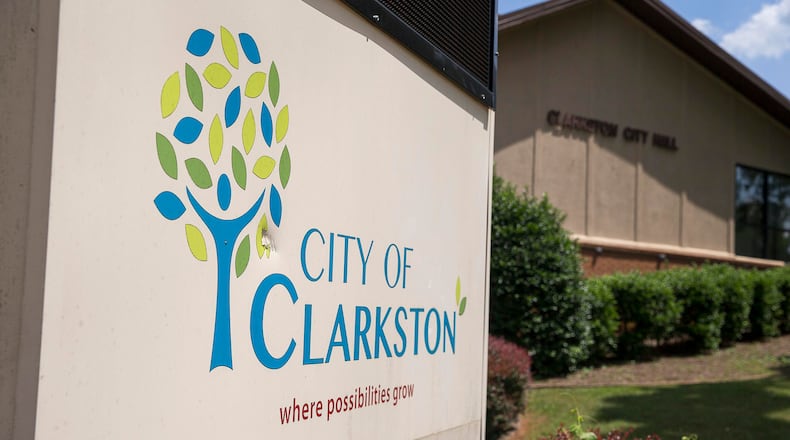Several DeKalb County cities plan to spend less in 2021 as they wait to see how long the coronavirus pandemic will affect the economy and their revenue.
Most cities whose 2021 budget begins in January are budgeting conservatively, focusing on essential services and immediate infrastructure needs.
A common theme across DeKalb cities, both big and small, is that they’re planning for little to no revenue growth from 2020 — just in case economic turmoil worsens for businesses or another shutdown takes place. Of DeKalb’s 12 cities, eight are working to write their 2021 budgets before the end of the year, and one has already passed its budget. At least half of the cities plan to reduce spending due to the pandemic.
In addition to playing growth estimates safe, many city leaders predict that traditionally reliable streams of tax revenue, such as hotels and commercial businesses, will be slow to rebound. The potential for residential property taxes to drop over the next few years is also a looming concern.
“I don’t think anybody has a good crystal ball of what revenues will look like next year, especially if you have to account for the surge (in COVID-19 cases) that we’re in right now,” Brookhaven City Manager Christian Sigman said. “Any thought that we would be back to normal by the second quarter of 2021 is fading very, very quickly.”
Close eye on property taxes
Brookhaven and Dunwoody, both northern DeKalb cities with similar populations, plan to cut their respective spending budgets by about 4%. Dunwoody approved its $24.5 million budget Oct. 26, and Brookhaven will vote on its proposed $29.9 million budget next Tuesday after a final public hearing.
Neither city plans to touch property tax rates, which remain among the lowest in the county. Sigman said hiking rates would hurt families who are struggling through the pandemic.
Dunwoody Assistant City Manager Jay Vinicki said the city is using its reserves to avoid having to raise property taxes, even though that may become necessary next year.
“Because we are using our rainy day fund to operate the city, the mayor has said out loud and the council has reiterated that we would look at millage (property tax) rates in a case where the economy does not improve," he said.
Property taxes make up the majority of revenue for smaller cities, such as Avondale Estates and Clarkston, and their city leaders are banking on property values not plummeting. DeKalb evaluates property values at the beginning of each calendar year, so the effects of the COVID-19 pandemic have yet to be seen on that crucial revenue stream.
Avondale Estates City Manager Patrick Bryant compared the potential for property value declines to the 2008 Great Recession.
“After the 2008 recession, it took the county (DeKalb) several years to revalue properties downward, so the impact of that economic downturn was not immediate," Bryant said. “I can’t predict the future, so it’s unexpected that there will be an impact on property taxes because of the COVID pandemic, but you don’t know.”
Differing tax bases
What helps cushion the risk of declining property taxes are new developments and residential construction. Both Avondale Estates and Clarkston cited new subdivisions, apartments and homes, including Clarkston’s recent tiny home project, as an expansion of their tax base over the past year. As a result, both cities actually project increased revenue next year.
Despite that, Clarkston City Manager Robin Gomez said he projects spending 0.3% less in 2021 than this year due to economic uncertainty. Homeowners have until November to pay their property taxes, and it’s unknown how many may fail to do so because of pandemic-related reasons.
Another unknown is whether rent and utility assistance programs — many of which were funded by federal relief money this year — will continue in 2021 if the pandemic continues to hurt those living paycheck-to-paycheck.
“There have been so many programs to help people pay their rent, including us, that we believe the impact will be very minimal (in 2020)," he said. "We won’t know what the impact is next year. We don’t know if there will be the assistance next year to help folks with their rent or mortgage or utilities.”
Another consistent revenue stream that will decline due to the pandemic is occupational taxes, effectively business license fees. Due to less commercial business activity, Avondale Estates expects to lose more than $88,000 of revenue from occupational taxes compared to 2020.
That’s only about 4% of Avondale Estates' projected revenue, but the commercial business sector drives in way more revenue for larger cities. About 6% of Dunwoody’s revenue comes from taxing hotels and motels, which were crippled during the COVID-19 shutdown, Vinicki said.
“In March, the hotels pretty much went to 0% occupancy, and they’re still incredibly low in comparison to what they were," he said. "That is the one part we do not see rebounding any time in the immediate future.”
Sigman said lower revenue from commercial taxes are expected across most business sectors, not just hotels. As a result, Brookhaven and Dunwoody are playing it safe by projecting no revenue growth for the next year.
Deciding what is essential
The lights must stay on though, so city leaders are forced to determine the most essential budget lines to prioritize. For Sigman, that means services that residents can’t live without and the barebones of infrastructural improvements.
“Police cars that need to be replaced next year will be replaced. (Information technology systems) that needs to be replaced next year will be replaced," he said. "Infrastructure and the day-to-day of getting stuff done will happen.”
Due to the coronavirus, a few new essentials have been added to that list, such as personal protective equipment, building upgrades for social distancing and other safety precautions. While coronavirus relief money can’t be used to subsidize normal spending, it has allowed cities to stock up on supplies and make those upgrades this year rather than next year, Sigman said.
In Dunwoody, Vinicki said the city will leave two police officer positions vacant until revenue amounts are more clear. Some city services, such as routine right of way clearing, may take place less frequently to cut spending.
Other cities are slowing down or delaying development and construction plans to reallocate funds to more immediate needs.
Avondale Estates Deputy City Manager and Finance Director Paul Hanebuth said the largest decrease in the city’s spending plans is for infrastructure projects. He described it as a precaution in case economic hardship continues.
“In a bad- or worse-case scenario, it would mean that capital projects are delayed possibly to 2022 instead of happening in 2021," Hanebuth said.
Avondale Estates, like many other cities, will finalize its budget in December.
About the Author
Keep Reading
The Latest
Featured



